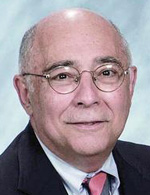In St. John’s Gospel we hear a lot about love and loving. I would bet that if one were asked, “what is love?” the answer would probably come from St. Paul: “Love is patient, kind, understanding,” etc.
All good thoughts about what love is. Great songs and poems tell us about love. In the song “Love is a Many Splendored Thing” we hear the words, “Love is nature’s way of giving a reason to be living, the golden crown that makes a man a king.” In Macbeth we hear, “Who could refrain that had a heart to love and in that heart courage to make love known?” All lovely sentiments. How do we make love known?
Recently I received an e-mail titled, “The Good Samaritan.” It had several pictures of acts of unselfish love: a man is seen taking off his shoes to give them to a homeless woman; a man had a heart attack shoveling his driveway, the emergency people showed up, took him to the hospital and returned to finish shoveling the driveway; a police officer handcuffed himself to a woman who was about to jump to her death so she would know he would have to go with her.
[hotblock]
Between sensitive words and heroic acts, we see hearts that have the “courage,” as Shakespeare tells us, “to make love known” as did the Good Samaritan. Why do people make acts of love? If I could borrow from St. James, I think he makes it clear when he says “[Love] without good [acts] is dead.”
It seems to me that love is a force that can take away our limitations, our hesitations. Love can release the Spirit and help us become the best we can be. Love helps us savor success and overcome disappointment.
It is easy to take our cue from our Catholic teaching. We note that the Blessed Trinity brought forth creation out of its essence, love. Christ became man and went through all the actions of man, except sin, out of love of us. The Gospels show us Christ is constantly touching or being touched: note the man born deaf, offering Thomas his wounded hands and side, consecrating the bread and wine, being tortured on the cross.
Note that in all the sacraments, in one way or another, there is touching — if not physical touching then heart-to-heart touching as in the sacrament of reconciliation. Today in the reception of the Blessed Sacrament, Jesus allows us to touch him and he us.
In all of our human endeavors there is not only the opportunity to love, there is the need to love. As Pope St. John Paul II tells us in “Redemptor Hominis,” “Man cannot live without love. He remains a being that is incomprehensible for himself, his life is senseless, if love is not revealed to him, if he does not encounter love, if he does not experience it and make it his own, if he does not participate intimately in it. This, as has already been said, is why Christ the Redeemer ‘fully reveals man to himself.’ If we may use the expression, this is the human dimension of the mystery of the Redemption. In this dimension, man finds again the greatness, dignity, and value that belong to humanity.”
Love is our mission.
***
Deacon Bill Masapollo is a retired permanent deacon of the Archdiocese of Philadelphia.
PREVIOUS: A paralyzed church is ill and needs the Spirit for courage, pope says
NEXT: What would it take for a divorcee to become Catholic?




Share this story